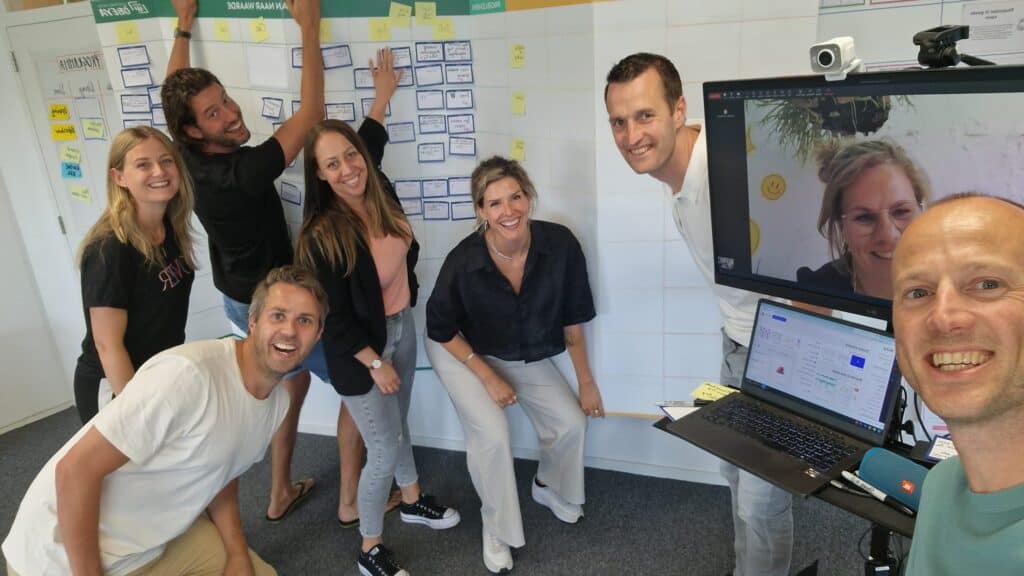
I worked as a consultant for over ten years with companies like Logica and Quint Wellington Redwood. In 2014, I discovered Obeya, a visual management tool that helps teams achieve their goals. Recognizing its immense potential, I developed a method to apply it to management teams. My book, “Leading with Obeya,” was released in 2020 and is now available in five languages worldwide. Since then, I’ve transitioned from being just a coach or consultant to managing my own organization. Have I faced challenges? Absolutely. Learn from my journey in my latest blog, where I reveal seven key tips for effective management.
Not everything went perfectly, which made me realize the importance of vulnerability.
-
If your team isn’t a real team, it won’t succeed
I started Leading with Obeya in 2020 on my own. By 2022, the team had grown to seven members. However, when I fell ill with COVID-19 in June that year, almost everything came to a standstill. I realized that this organization could only be successful if it could function without me. For that to happen, the team needed to become a true team, united by a common goal even without a ‘boss’ pushing them.
-
A team truly becomes a team when they are part of a bigger picture
Yes, this can include freelancers! People don’t have to be in the same physical space full-time to be a team. What is crucial is that they feel like they are part of the whole and actively contribute to it. As Daniel Pink says, autonomy, mastery, and purpose are our primary motivators. After I had been away for a few weeks, we spent a day discussing where we wanted to take Leading with Obeya. I set a goal, and everyone contributed their ideas, discussed how we wanted to work as a team, and outlined our goals and KPIs.
After that day, our strategic direction, goals, plans, and KPIs were crystal clear on paper. Because everyone had made a significant contribution, we transformed from being just a group of people trying to achieve something together into a passionate and dedicated team working together to achieve common goals.
-
Keep the strategic plan and team spirit alive
We agreed to have another such session three months later. However, day-to-day distractions, full calendars, and other responsibilities got in the way. Before we knew it, five months had passed before our next strategy day. This led to organizational debt – we had too much to discuss in too little time. We uncovered issues that we should have addressed much earlier.
Since then, I have meticulously planned our quarterly sessions a year in advance. This ensures that not only our plans and performance are accurately monitored but also that the team spirit remains strong. We typically conclude these quarterly sessions with a dinner where we focus on anything but work, which is equally important.
-
Delegating doesn’t mean you can always let go completely
As a manager, you shouldn’t try to control everything, especially if your goal is for the team to function without you. However, I learned that it’s essential to strike a balance. For example, we’ve been working on developing an e-learning program for three months with two team members leading the effort. We had planned a day to record videos for the program, but it quickly became apparent that we weren’t ready for that yet.
Instead, we spent the entire day further refining the program’s content. While this was valuable, it also meant wasted time and effort. In summary, you can delegate, but it’s wise to keep an eye on things by occasionally checking in to see how it’s going and offering assistance when needed.
-
Bring in people who excel in their areas
I’m not particularly strong in commercial and marketing aspects. However, a successful organization needs both. During one of our early events in January 2022, we had only around twelve attendees, with over half being our team members. In other words, it wasn’t very successful. That’s when I decided to invest in a skilled marketer, Frank. A few months later, we had our first sold-out event, with a waiting list. It’s been that way ever since.
-
Be honest
In my previous life as a consultant, I learned to occasionally embellish things slightly. Being too honest might cost you clients, was the belief. I strongly disagree with that notion – being open can actually win you clients. I’m also honest with my team; I share my mistakes and shortcomings and ask for help when needed. Lack of honesty is one of the main reasons teams don’t function well. In short, be the change you want to see!
-
Patience is key
Entrepreneurship often requires a great deal of patience. Initially, our business model is focused on helping teams rather than earning significant profits for ourselves. Developing an e-learning program is exciting, but it doesn’t generate revenue at this point. You must sow a lot before you can reap. In summary, patience, more patience, and even more patience.
Would you like more insights like these and tips to better address your management challenges? Then follow us on LinkedIn. There, you’ll find not only interesting opinion pieces and blogs but also more information about our events.
Let’s create meaningful content, together
What would you like to read or learn more about? Let us know below, and we’ll write a blog about it or message you personally. We want to help you get more out of Obeya. Together, we’re working towards a better world through better leadership.

